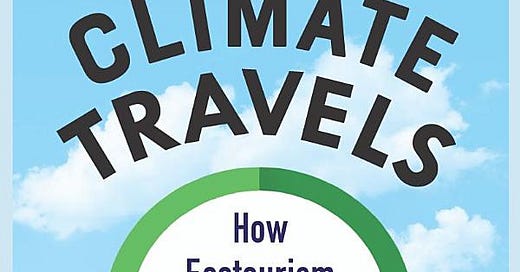Climate Travels: How Ecotourism Changes Mindsets and Motivates Action
Michael M. Gunter Jr.
Columbia University Press 2023
360 pages
In his new book, Climate Travels: How Ecotourism Changes Mindsets and Motivates Action, Michael M. Gunter reviews the ramifications of climate change from semitropical Florida to icy Alaska. He also visits places in the United States that are implementing climate-focused countermeasures to prevent a planetary meltdown.
In the first eight chapters, Gunter examines the changes that global warming is bringing to this country, and by extension, the rest of the world. He covers everything from the increased heat island effect that threatens the health and even the lives of city dwellers to the increasing strength of hurricanes that pummel our Gulf and Atlantic Coasts.
Gunter’s scope is comprehensive as he delves into the effects of our out-of-control emissions. Our seas are rising, partly because glaciers and Greenland are melting, but also because warmer waters are subject to thermal expansion. Larger and more numerous wildfires not only threaten communities like Paradise, California, they also allow invasive species to expand into once-pristine wildlands.
With the second part of the book, Gunter examines solutions to our climate crisis. He describes the promising trend toward generating more electricity from wind-powered facilities. Cities, such as Portland, Oregon, offer themselves as paradigms of sustainability with their interesting, walkable streets. Gunter even considers geothermal energy, an often-overlooked green power source. Once a popular fossil-free alternative, geothermal energy has fallen out of favor over the last 20 to 30 years. It’s good to hear about its new developments.
Gunter, a Distinguished Faculty Member at Cornell University and Arthur Vining Davis Fellow at Rollins College, deserves much credit for addressing global heating elephant in the room: sacrifice. This is rarely mentioned in the context of sustainability. Politicians and policy makers believe they will lose elections and jobs if they say Americans should cut back on their conveniences. But Gunter devotes a whole chapter to living more sustainably by consuming less, even harkening back to the time when President Jimmy Carter admonished the nation as being more concerned with things than with their families or churches. It’s really a no-brainer. Some of the simplest methods for reducing emissions are driving less, eating less meat, and buying less stuff.
This book covers a lot of ground in 240 pages, and Gunter’s writing style makes for an enjoyable read despite some grim truths. I have only a few points of disagreement. For example, he suggests eating a local diet, yet there is little to prove that consuming locally grown corn and kohlrabi really brings down emissions. Power-saving devices, like EnergyStar appliances, should be widely used, yet some inventions have become counterproductive. Energy-efficient air conditioning, for example, spurred development and population growth in places like the Southwest, where air conditioning is a necessity, thus increasing overall electricity use instead of bringing it down.
We all know not to judge a book by its cover, and we might reserve judgment on a book’s title as well. After all, Slaughterhouse Five has nothing to do with meatpacking, while slaughterhouses are central to The Jungle. Though Gunter travels about as he illustrates our climate problems and solutions, the subject of ecotourism in his book’s subtitle was not developed. Gunter does travel, and he does bring up ecotourism from time to time; however, it seems as if the topic was an afterthought. Climate Travels is a good book, but someone who sponsors ecotours of old-growth forests, picking up this book in hope of learning more about the business, would probably be disappointed.
Notes on editing proofing and indexing
Climate Travels was one of the most error-free books I’ve read recently. Hat’s off to the unnamed proofreader—I found only three instances where a comma was needed. Copyediting was also quite good. The book is well-organized, except for a few digressions, such as the chapter on green buildings, which briefly drifts off topic to electric vehicles. Gunter thanks Fred Leise for his indexing. He is correct: the index is comprehensive and complete.






